MARISSA STAPLEY is the New York Times bestselling author of Lucky, which was the first-ever Canadian Reese’s Book Club pick and soon to be an Apple limited series starring Anya Taylor-Joy, as well as the novels Mating for Life, Things to Do When It’s Raining, and The Last Resort. Her most recent books, The Lightning Bottles, a story of nineties rock and star-crossed lovers, and Three Holidays and a Wedding, a rom-com co-written wih Uzma Jalauddin, were released in Fall 2024. She has also co-written the holiday rom-coms The Holiday Swap and All I Want for Christmas under the pen name Maggie Knox. Marissa has also worked as a sports reporter, cemetery gardener, bartender, destination travel rep, stable hand, and magazine editor — but becoming an author is a dream she has harboured since the age of seven, when she decided she was going to be the next L.M. Montgomery. She lives in Toronto with her husband and two kids.
Describe your writing space. What do you love about it?
I’m lucky to have a room in the back of our home with high ceilings, a big window overlooking some of my favourite neighbourhood trees, and a skylight. The perfect office space! Yet somehow, this room always ends up as the dumping ground for books, ARCs, manuscripts, extra furniture, the boxes of items we’re planning to get around to donating to charity … you get it. I’ve told myself for years I’m going to find the time to turn it into a beautiful writing space, once I get through whichever deadline I’m working on—but a decade has passed, and the deadlines keep coming. This is great, of course. Writers need to be working! But it’s not so good for my back health. I’m always moving from room to room, sitting on couches, beds or easy chairs. So, I’ve resolved not to start on a new book until my office is set up properly. I’ve ordered an ergonomic desk chair and standing desk, given the room a fresh coat of paint in a gorgeous green, and am in the process of purging anything in the room that is not conducive to creativity. It’s a work in progress, but one I’m determined to finish very soon.
How important is it to have ‘a room of one’s own’?
So important—especially as a writer. Writing doesn’t always require solitude. In fact, I often find I’m at my most creative in a busy café or the midst of family chaos. But once a book or writing project reaches a certain stage, concentration is required. This is the point where I find myself going up to the cottage for a few days alone, or on retreat with other writer friends in the same stage with their projects. It’s also the point I tell myself I really need to get around to finishing the set up of my own writing space, which makes me especially glad that as I write this, I’m so close.
Any rules for when you’re in this ‘space’?
That’s actually an interesting question. I wonder what rules for a writing space would look like. No mindless scrolling, maybe? No emotion-driven online shopping? I actually think a good rule would be to get up and go for a walk during the moments when the writing feels blocked, because I always find it’s when I’m away from my computer that the tricky plot point or character issue seems to unknot itself.
What is your writing practice like?
I like to write in the morning. I used to get up very early, a somewhat reluctant member of the ‘five am club’. This worked really well when my kids were little, but they’re teenagers now and everything in our house seems to happen later, meaning early mornings aren’t as pleasant. Now, I just try to guard my mornings for writing as much as I can, and book appointments and social engagements for afternoons or evenings. I can’t write more than four or five hours in a day, and even that’s probably ambitious. But, of course, so much of writing is also research, or editing, or even admin. There’s no time limit on that. It’s generally all dictated by my deadlines. Considering I write romance novels under a pseudonym in addition to my own fiction, my deadlines are quite rigorous and strict.
“I believe Stephen King is the writer who said there’s nothing quite like a deadline to awaken the muse. It’s true. For better or for worse, I seem to work best when the muse is holding the proverbial gun to my head. Not pleasant, but it works.”
Do you quantify your process by word count or hours spent writing?
I tend to set word count goals, yes. If I can reach a thousand words, that’s a good day’s work. However, I use a writing program called Scrivener that allows you to set project targets and word count goals. And the targets shrink the closer a deadline gets—meaning there could be days when my goal is more like five thousand words. There have even been days when I’ve written closer to ten thousand. Even typing that makes me feel lightheaded! I definitely get into what feels like a trance during those days; it’s exhausting in a way that feels like I’ve been doing physical labour. My kids always know I’m reaching the end of a writing project – when, of course, the word count targets always creep higher on account of procrastinating – because I start to forget words and become very absent-minded. All my mental energy gets poured into the work.
What is your creative process like?
Once an idea comes to me, it’s almost as if it lives in a cloud above my head, shifting and forming, then reforming. Sometimes, it dissipates entirely. But if I walk around for a few months with the same idea, I know I’m onto something. That ‘cloud’ stage is necessary. I can be working on another project while allowing another idea to take shape, but no matter what I’m writing, the idea always needs that few months to take shape. Then I’ll usually write a quick synopsis and/or outline to send to my agent, and it will go from there.
My first drafts are lean. I’m fine with pressing forward even if I’m not entirely sure where the story is heading. I’ll then go back and adjust the outline to reflect the new directions the story has inevitably gone in, then start on a second draft. At this point, or earlier, editors are usually involved and we start working together on a few more drafts. I’ve said in the past that editing is not my favourite part of the writing process—even though I’m well aware that books (and writers!) are made during editing. It’s such hard work, and is completely worth it. But it’s sort of like working out. You have to do it to see results, but isn’t a walk along a beach or through a forest, with no real idea of your direction, so much more exciting and fun? That’s how I feel about first drafts. They don’t scare me at all.
What does scare me are the moments before I open an editorial note. This never changes: I’ll send off a draft and start to spiral into thinking my editor is going to hate it, and my publisher is going to cancel my contract. I wish I were exaggerating. But, every time I feel this way, the editorial note I receive is glowing—even if it does contain suggestions for more work to do. There was only one time in my career, years ago, when I sent off a draft I felt extremely confident about. I won’t get into too much detail, but I think it’s safe to say cancelling the contract was on the table. Which is why I’ve learned to live with the self-doubt as much as I can. Alas, the crushing imposter syndrome is part of being a writer for many of us.
What is the easiest and most difficult part of the process for you?
I love writing! While I’m doing it, it feels easy. When I’m editing, it feels impossible. I have a writer friend who feels as I do about the editing process. When we’re in it, we’ll send each other funny texts about different career paths we should have taken. Barista. Pilot. Waitress in a small town. Black ops. Anything, anything but this. Then it’s over and we go back to loving being writers again.
Why do you write? What do you love about writing?
I write because there is nothing else I have ever been but a writer. As a child, I dreamed of becoming an author. There are writers in my family, so I was told from a young age that I had “the writing gene”. I was heartily encouraged, not just by my parents but by aunts, uncles, grandparents. Writing is just something that has always come naturally to me. I feel at my best while doing it – perhaps the way a basketball player or runner feels. I don’t know for sure, having absolutely zero athletic ability, but I do know how great it feels to be in a ‘writing zone’, the way my body and mind reacts to it.
“It’s exhausting at times, yes. But writing is simply as natural to me as breathing.”
It's also a tremendously difficult way to make a living. During times I’ve gotten close to giving up, the only thing that kept me going was knowing I had no other options. I’m a writer. I have to be a writer. This is why I work so hard, write romance novels under a pseudonym, spent years as a journalist, both in-house and freelance, why my books are just part of the tapestry of my writing career. It’s why I know that when one book doesn’t work out (as in, get a publishing contract or even attract a literary agent; sell as many copies as hoped, etc.) the only thing to do is move onto the next book. To keep going, to never give up. The tenacity that the writing life has awakened in me is one of the things I love most about writing.
And, what I love most about writing fiction is the way it’s ultimately so truthful, even under the guise of being entirely made up.
Best advice you’ve ever been given.
I’ve said this so many times I wonder if people are starting to get tired of hearing it, but the best advice I ever received was from my first publicist (Adria Iwasiatiuk, who was at S&S Canada at the time) who told me that writing and publishing is a marathon, not a race. It’s so true. You do feel like you’re in a race at first-- against yourself, time, other writers who might get to your idea first, your deadlines, your schedule, maybe your age. But the fact that with every book you start fresh, you do it again—even if you didn’t achieve the result you wanted, even if you’re not starting that second “race” decked out with laurels and accolades—requires an extreme amount of wherewithal. Again, I have zero athletic abilities, but I imagine this has to feel the same way running a marathon would. Wildly energetic moments, moments when you think “I could be doing literally anything but this right now, why did I choose this?”, moments when the endorphin rush is euphoric … but getting to the finish line (which, by the way, I haven’t reached yet) requires self-care, self-awareness, a careful balance of self-confidence and self-doubt … it’s not for the faint of heart.
“Hang onto yourself as best you can. That’s the only advice I can really offer.”
What does success look like to you?
A good question. In the publishing world, there’s a lot of talk about how the goal posts are always moving. I’m sure this is true of any profession. You reach one goal, and the next one reveals itself. This is hard, because it can mean you never get to actually bask in the success you were striving for. But it’s also wonderful, because I think striving for something is part of what makes life worth living. I love having a dream and working towards it. I love that, in my profession, there is no limit to what I can dream—even if sometimes, there are limits to what I can achieve. I actually don’t think I have an answer to the question of what success looks like. I’m aware that I’m classified as a “successful” author, and yet when someone refers to me as such, I always feel a jolt of surprise. Maybe true success as an author only happens when you’ve been dead for a hundred years and people are still reading your work. Or, maybe I’m just being dramatic.
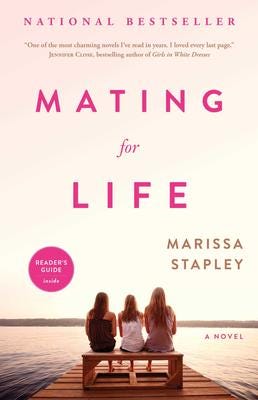
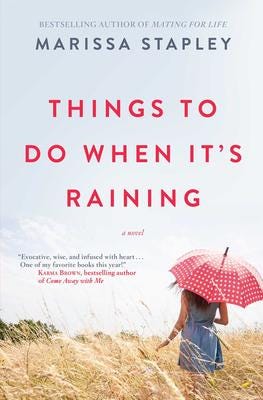
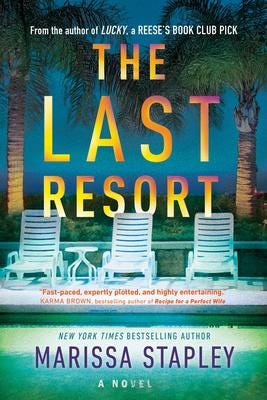
What can books teach us? How do they change us?
There is no limit to the capacity of books and stories to teach us, to transform us. I love that storytelling is a part of the fabric of being human and that the many complex reasons for this are tied to our survival and humanity. I think it’s interesting that we’ve experienced such great change as a society, especially with the advent of technology, and yet we still read and collect paper books, with no signs of this slowing down. I think an alien coming to earth for the first time would find this so strange, that we have access to so much information at our fingertips and yet have an attachment to these written words, these stories on paper, in books. It’s very comforting to me, not just because I make my living creating these stories, but because our love of books and stories speaks to something ultimately good about humanity as a collective. We have lost so much, changed so drastically, but our thirst for stories and the transformative power of them remains.
What was a transformative book for you in your life?
A Prayer for Owen Meany, read when I was a teenager, was life-changing. It was so long ago it’s hard for me to convey why, and I started to wonder if maybe the experience felt heightened because of my age. But, a few years ago, I gave the novel to my husband to read. He’s not a big fiction reader (aside from mine) and asked me to recommend a novel to him. The pressure was intense. I’m not exaggerating when I say I lost sleep. I was in the room with him when he finished (trying to be cool about it, ha). He closed the book, looked at me, and said, “Thank you. I think I’m a better person because I read this book.”
He asked for another recommendation recently. I gave him James by Percival Everett—which he, not surprisingly, loved. Up next for him is Samantha Harvey’s Orbital, but he has to wait for me to finish. I only have a few pages left, but I’m reading it more slowly than I’ve ever read anything. I don’t want it to be over. If you’ve read it, you’ll understand why. If you haven’t, do. I think everyone on the planet needs to read Orbital. It’s absolutely stunning.
Who are your favourite writers writing today?
Samantha Harvey, Zadie Smith, Miriam Toews, Ann Napolitano, Katherine Heiny, Lily King, Holly Gramazio, Maggie O’Farrell, Emily Henry, Suzy Krause, Haruki Murakami, Carley Fortune, Julia Glass, Celeste Ng, Thomas King, Emily St. John Mandel, Barbara Kingsolver … I have to force myself to stop.
What books are you currently loving?
As mentioned, Orbital by Samantha Harvey is one of the most beautiful novels I’ve ever read. My favourite books tend to have a combination of excellent writing and a cracking plot, and yet, this novel has almost no plot. Still, it’s probably one of my all-time favourites because of the singularly beautiful way Harvey writes about Earth. I’ve never read anything like it. I’ll say it again: everyone should read it.
If you were a bookseller what 5 books would you hand-sell to readers and why?
Orbital by Samantha Harvey (please see gushing accolades above); I Think We’ve Been Here Before, by Suzy Krause, which somehow manages to be cozy and heart-healing while also decidedly apocalypse fiction and somewhat terrifying; The Lacuna by Barbara Kingsolver, an all-time favourite and just, to me, a perfect novel in the way it manages to educate, inform and be a complete page-turner, all in one; anything by Emily Henry or Carley Fortune, because they are both fun and smart, and have managed to redefine and revamp one of my favourite genres; and, although it’s not out yet, The Names by Florence Knapp, which (at least in my world) is a very buzzy book I’m happy to report absolutely lives up to the hype. It’s intricate, heartrending, ambitious, unique. I have to add one more: The Husbands by Holly Gramazio is brilliant. It seems far-fetched and it is (an attic that produces an unlimited supply of husbands, all of whom can be sent back, although that part gets tricky …) – which makes it all the more magical that she pulls it off.
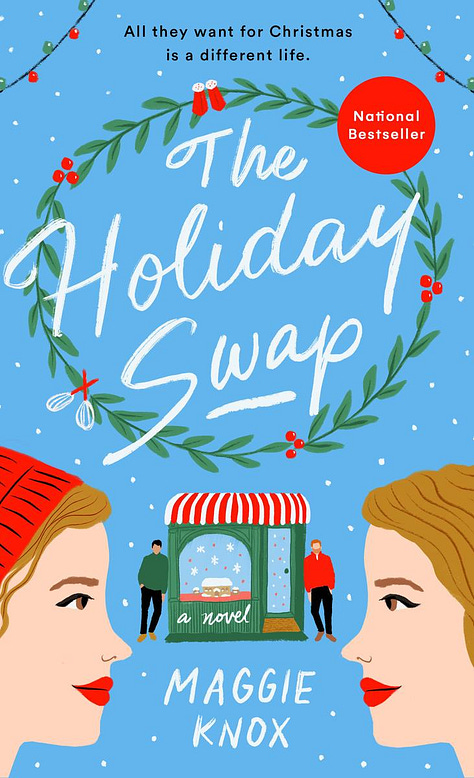
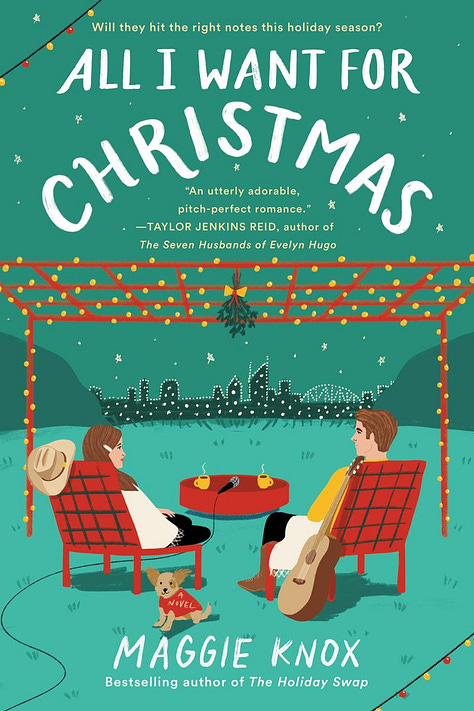
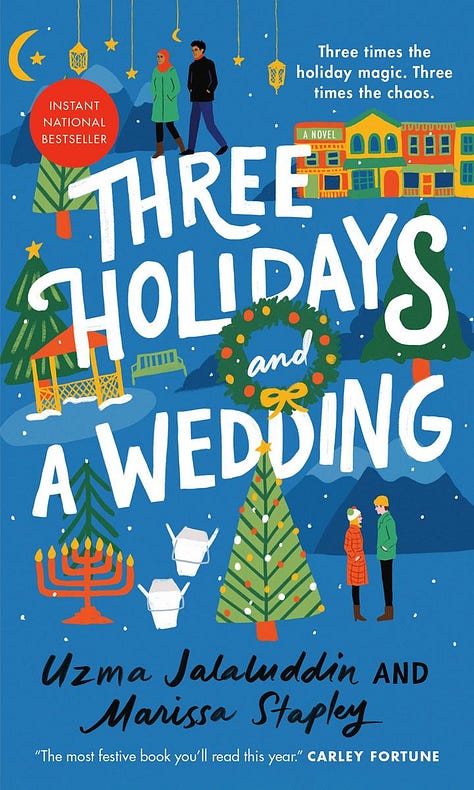
Thank you Marissa.
To learn more about Marissa, and her books, visit her at www.marissastapley.com

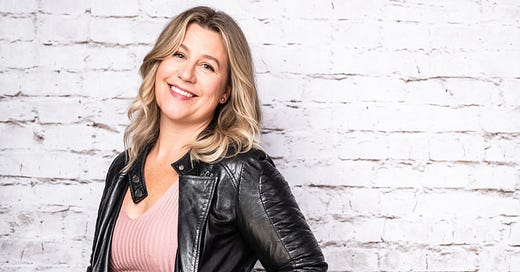



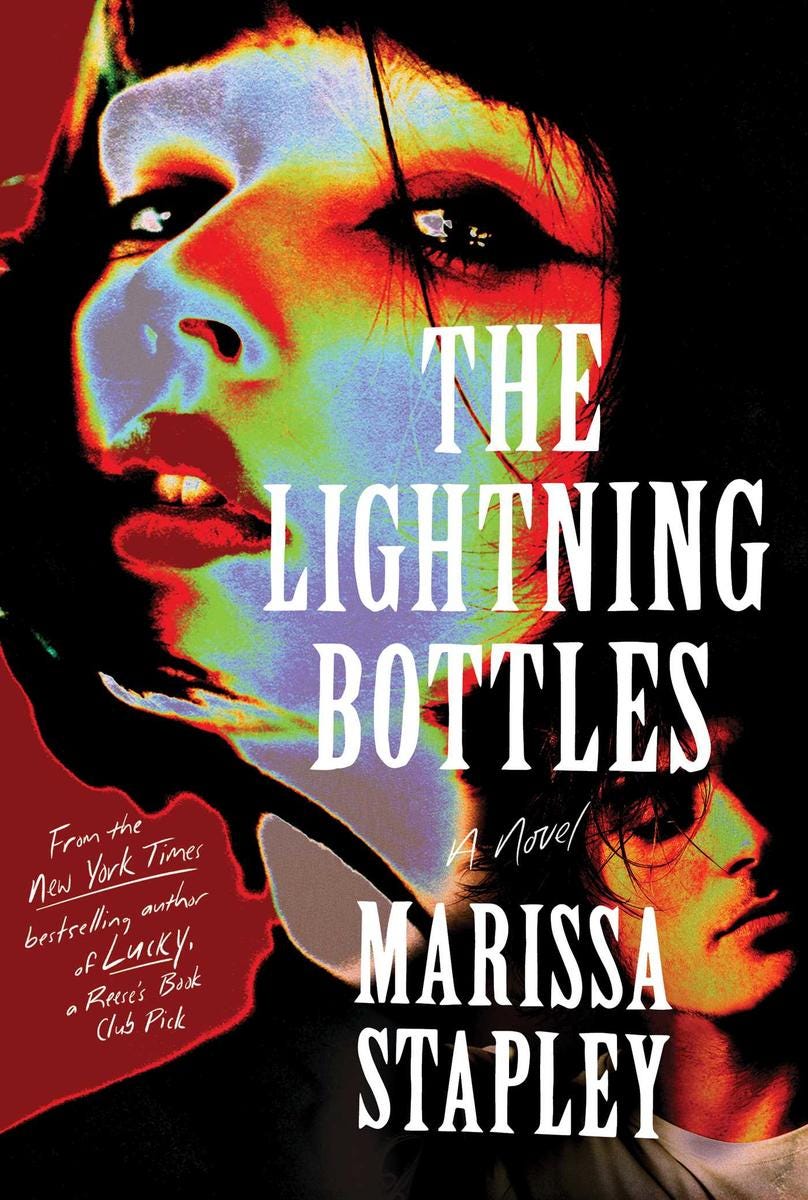
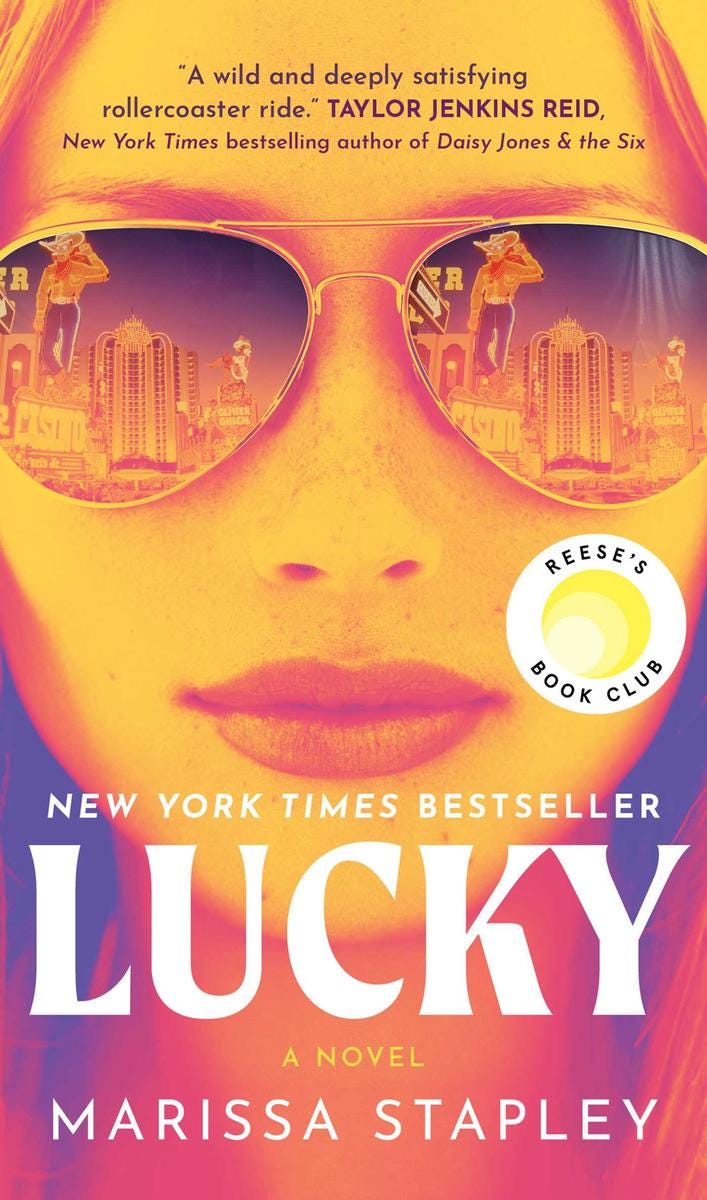
"Wildly energetic moments, moments when you think 'I could be doing literally anything but this right now, why did I choose this?' " -- that tracks!!! Thanks for a great read. Maybe if I get my writing space in shape there will be more energetic moments ;)